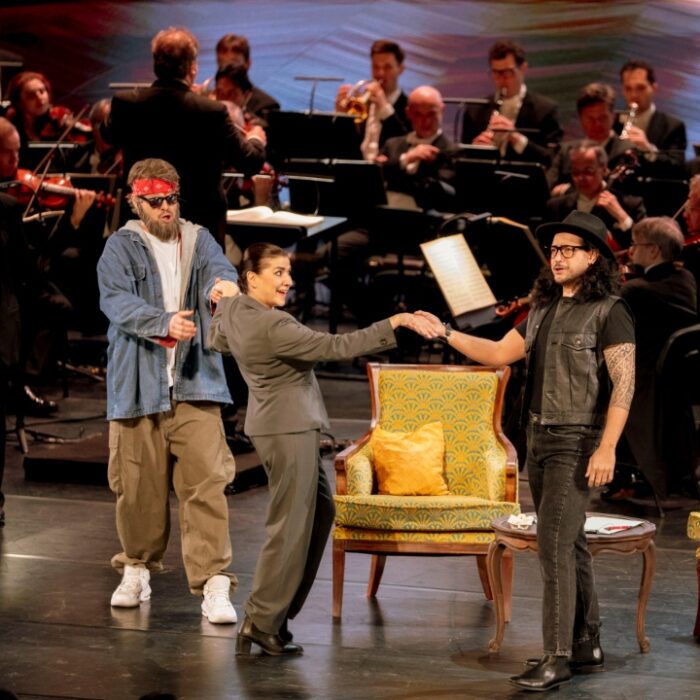
HamburgMusik 2024-25 Review: Idomeneo
René Jacobs’ Theatrical Brilliance in Semi-Staged Concert
By Mengguang Huang(Photo Credit: Claudia Hoehne)
René Jacobs’ concert performance of Mozart’s “Idomeneo” at the Elbphilharmonie provided a resplendent conclusion to Hamburg’s Amadeus Festival, bringing the celebration of Mozart’s genius to a fittingly grand finale. This semi-staged version was a testament to how a concert performance can achieve full theatricality. Compared to his 2009 recording, Jacobs presented a fresh and immediate interpretation, aided by the exceptional talents of the Freiburger Barockorchester, the Zürcher Sing-Akademie, and an outstanding cast of soloists.
The Freiburger Barockorchester, under Jacobs’ direction, delivered a performance that captured both the operatic grandeur and the intricate details of “Idomeneo.” Their excellence was particularly evident in the storm scene of Act one, where Mozart’s orchestration—deeply influenced by the Mannheim school’s dynamic contrasts—came alive with thrilling precision. The surging crescendos and abrupt dynamic shifts painted a tempest that felt almost tangible, each phrase heightening the sense of imminent catastrophe. The string section’s taut, biting articulation drove the storm’s fury, while the brass and timpani provided a relentless undercurrent of menace. Emerging from the turmoil, the woodwinds cut through with eerie clarity, foreshadowing the tragic weight of the drama.
The Elbphilharmonie’s minimalist yet striking lighting design further heightened the impact of this scene. Cold, intermittent flashes synchronized with the orchestra’s surging waves of sound, evoking the blinding chaos of a raging storm. This stark illumination, briefly revealing the musicians before plunging them back into darkness, added a cinematic dimension to the performance, proving that even in a concert setting, visual elements can intensify theatricality.
The soloists were the heart of the evening, each bringing a distinctive depth to their roles. Ian Koziara as Idomeneo combined vocal power with emotional vulnerability, shaping a compelling portrayal of the tormented king. His “Fuor del mar” was a commanding display of technical precision and dramatic tension, his voice shifting effortlessly between regal authority and inner turmoil. Olivia Vermeulen’s Idamante provided a striking contrast—her warm, lyrical mezzo-soprano radiated sincerity, particularly in “Non ho colpa,” where grief and longing intertwined beautifully. Her duets with Polina Pasztircsák’s Ilia were imbued with tenderness and urgency, their voices blending in moments of soaring intensity. Pasztircsák, for her part, brought both purity and passion to her role, with “Zeffiretti lusinghieri” floating above the orchestra in a breathtaking display of vocal elegance.
Kateryna Kasper’s Elettra was nothing short of electrifying. From her first entrance, she commanded attention, her voice brimming with intensity and fury. Her rendition of “D’Oreste, d’Ajace” in Act three was a tour de force, her incisive phrasing and dramatic inflections turning the aria into a visceral outpouring of rage and despair. The audience, gripped by the sheer force of her performance, erupted into one of the night’s most fervent ovations.
The Zürcher Sing-Akademie, as the Cretan chorus, was a powerful force in the drama, delivering a performance that was both technically flawless and emotionally resonant. Their contribution to the opera’s themes of justice and mercy was particularly moving in “Pietà, giustizia, amore,” where their voices swelled with a richness that underscored the work’s moral complexity. More than an accompaniment, the chorus became an active presence in the drama. Their visually striking, contrast-based costuming further enhanced the concert’s theatricality, reinforcing their commanding vocal presence and Mozart’s choral grandeur.
The evening was further enriched by the contributions of Mark Milhofer and Krešimir Špicer. Milhofer, in the role of the High Priest, brought a commanding presence to his performance. His resonant tenor cut through the textures of the orchestra with authority and precision. Špicer, as the voice of Neptune’s oracle, imbued the role with both gravitas and mysticism, his voice serving as an ominous forewarning of the divine forces at play. Their performances, while brief, added powerful moments of tension and mystery to the unfolding drama.
Jacobs’ conducting was a masterclass in precision and flexibility, fully embracing the Freiburger Barockorchester’s immense capabilities while allowing ample space for their artistry to shine. Compared to his 2009 recording, this performance featured even greater dynamic contrasts and heightened dramatic expressivity, making it both more expansive and more penetrating in its impact. From every perspective, this was a performance of rare perfection—one that invites repeated study, and reaffirms Jacobs’ deep insight into stage works and his ability to continuously refine and elevate his interpretations. More than a conductor, he remains a visionary storyteller, proving that even without elaborate staging, “Idomeneo” can be as gripping and theatrical as ever.



